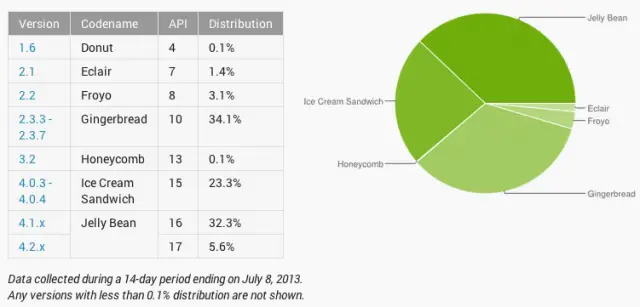
As much as Apple would like to rub it in the faces of Android users, fragmentation isn’t the hyped-up issue it was only a few years ago. Concerns about a scattered platform haven’t quite panned out as some predicted. While Android users are still split mostly between three major platform versions (Gingerbread, Ice Cream Sandwich, and Jelly Bean), Google has actually done a pretty good job of creating a consistent mobile experience for its users. Speaking this week at the Massachusetts Technology Leadership Council, Android co-found Rich Miner agrees.
Miner is of the opinion that fragmentation talk is still “overblown,” and points to the difference between the common user and tech enthusiasts and the blogosphere. Miner posits that the average smartphone buyer is happy with the experience their device offers. They don’t necessarily yearn for new software updates or particularly care when they arrive.
It might be a bit of a generalization to categorize the average smartphone user as ignorant to things like software versions and updates. Looking again at Apple, they definitely do a good job of building up hype for their iOS updates. More recently Google has shifted away from turning the release of each new Android iteration into a marquee event, which probably works in their favor. Still, there is no denying that there is indeed a level of fragmentation with Android that can often create a frustrating experience for users.
[via Xconomy]

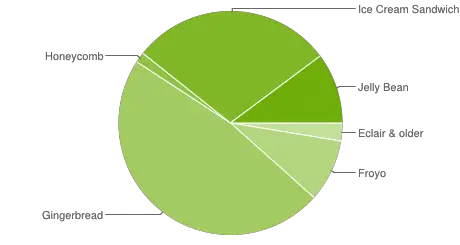
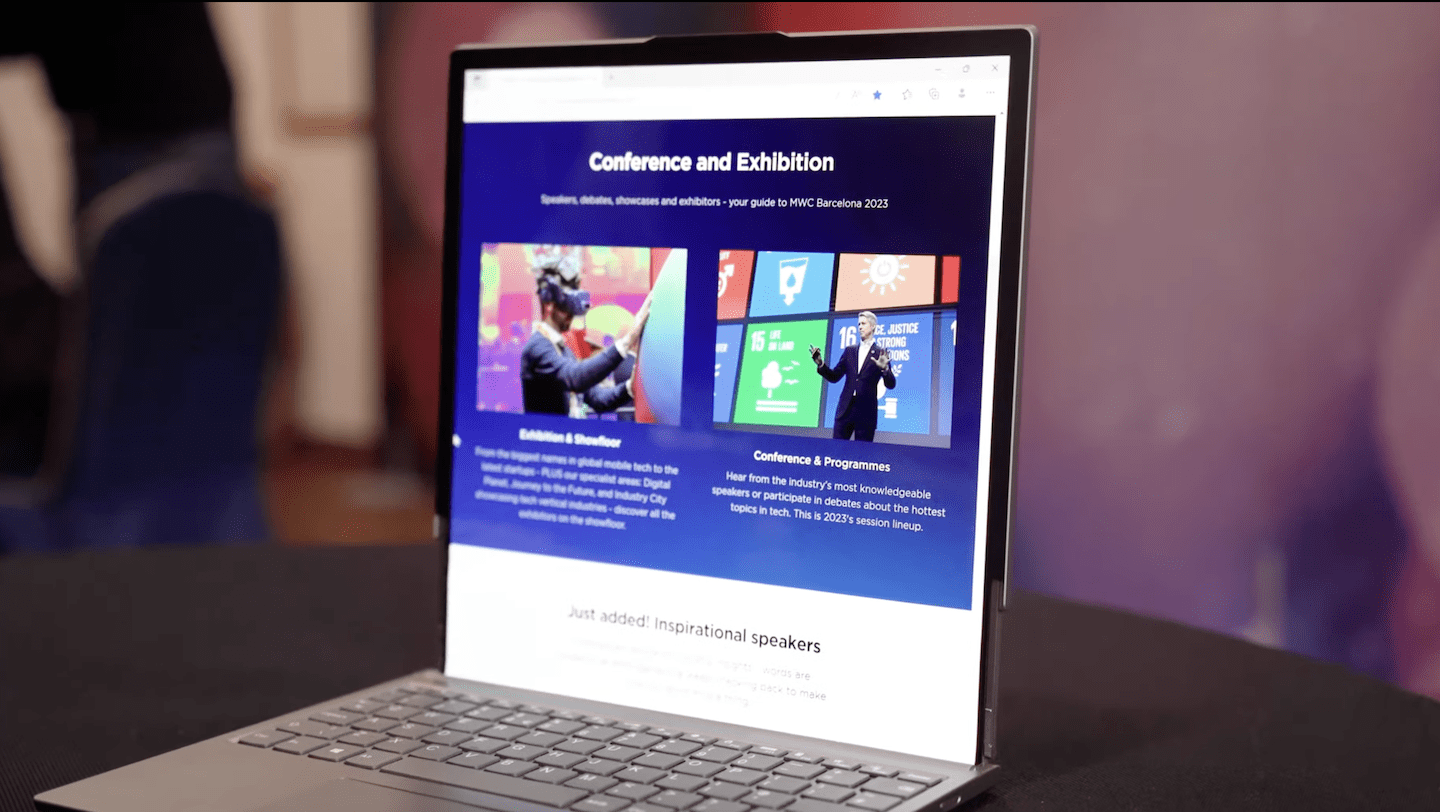
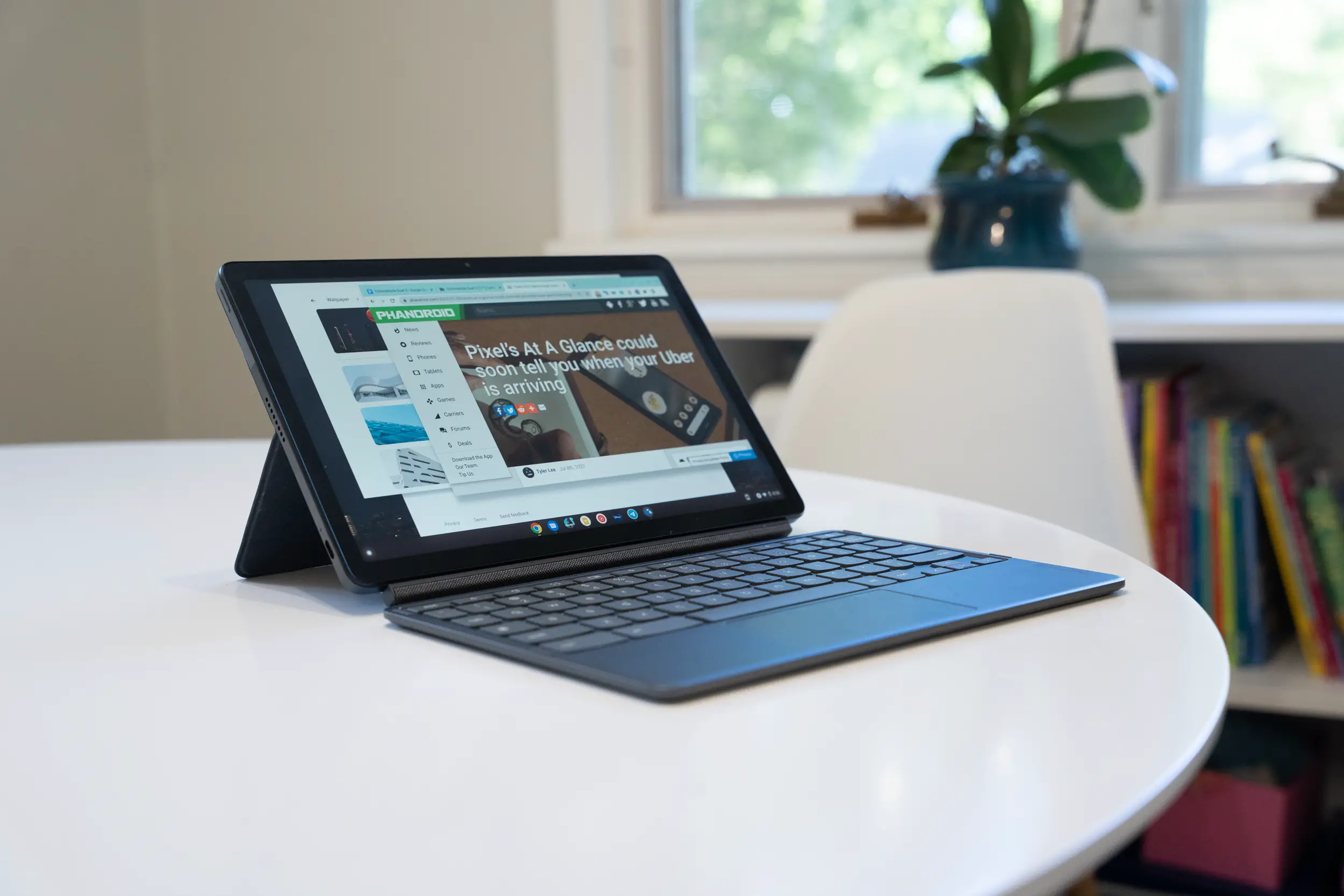

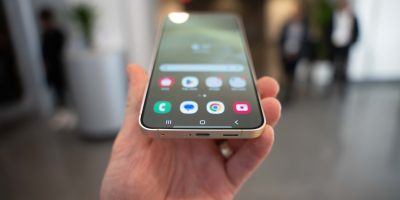





i mean, some people care, some people don’t, it all just depends, y’know?
So out of the the top tier smart phones, and even second in line for most companies, what would this chart look like? Probably all ICS or higher
Exactly, one of the guys at my shop just went and picked up his new phone from MetroPcs today and it was running 2.3.3.
Android co founder? I thought one person started Android, Andy Rubin.
Wikipedia
Android, Inc. was founded in Palo Alto, California in October 2003 by Andy Rubin (co-founder of Danger),[25] Rich Miner (co-founder of Wildfire Communications, Inc.),[26] Nick Sears[27] (once VP at T-Mobile),[28] and Chris White (headed design and interface development at WebTV)[10] to develop, in Rubin’s words “smarter mobile devices that are more aware of its owner’s location and preferences”.[10] The early intentions of the company were to develop an advanced operating system for digital cameras, when it was realised that the market for the devices was not large enough, and diverted their efforts to producing a smartphone operating system to rival those of Symbian and Windows Mobile (Apple’s iPhone had not been released at the time).[29]
It pretty much falls between 4.0+ and 2.3 Phones. Those are the real problems for developers. Many new apps are just doing 4.0+ and really that’s a smart way to do it. Those older devices are going to for the most part have hardware issues or are going to be replaces soon if they care at all about apps.
Some apps are pulling 4.2.2 support long after making it available. I had iHeart radio on my Nexus 10. I had to uninstall it because it kept force closing. When I went back to give it a second chance a few weeks later, it didn’t show up in the Google Play store. I tracked it down to the company website and it stated it wasn’t compatible with my device.
That’s a device issue not a version issue. I’m running 4.2.2 and it shows up just fine on my device.
when I had my mytouch 4G it started with Android 2.2 Froyo I was happy when it upgraded to Android 2.3 Gingerbread .by the time I got the update to 2.3 4 , ICS was already out. I skipped ICS and went straight to jelly bean when I got my samsung galaxy s3 .happy camper here…
The about 40% of non 4.0+ devices are probably devices people got because they just wanted a phone and that cheap android phone was free, so why not, they can check their emails. But they don’t even know how to install apps, so coding for 4.0 is probably pretty safe by now. Of course I’m generalizing but I don’t know anybody with some tech savviness that is still using something below ICS. And those who are are probably approaching the end of their contract and will soon switch phone.
I’m in the used phone business, have been for over three years. Older Android devices still sell because either people need to replace their expensive one they broke, or some just prefer the older devices. The remaining customers on older Android versions are usually young kids with their first phone (or a replacement phone) that their parents bought for them.
I have plenty of low end Android phones that sell really well. Some customers find it hard to turn down a $25 smartphone and most never complain about it, unless it has an actual defect. Believe it or not, even the older Windows Mobile phones tend to sell better than some of the newer Windows Phone 7+ phones.
These numbers aren’t actual device numbers but the numbers of devices that enter the play store. There’s actually less 4.0+ users than this, sadly.
Don’t you mean there may be MORE 4.0+ users than the numbers show? I understand the chart is a snapshot in time of unique devices accessing the Google Play store in the 14 day period prior to the snapshot. You can claim that not all the Android devices out there are counted but you surely cannot claim that access by devices that don’t exist are in the numbers..
I mean what I said. It accounts whenever a user accesses the Play Store. People on 4.0+ access Play more often and are therefore given a larger slice of the pie than they should.
When they did this switch a couple months ago there was a drastic increase for 4.0+ users.
I mean what I said. It accounts whenever a user accesses the Play Store. People on 4.0+ access Play more often and are therefore given a larger slice of the pie than they should.
When they did this switch a couple months ago there was a drastic increase for 4.0+ users.
As a developer I prefer the old way because I (like most developers) don’t exclusively publish to Play.
Actually it counts a device only when it accesses Google Play AND downloads an App. Simple search access and updates do not add to the current numbers, thus the higher relevance to developers publishing on Google Play. From what i understood about the previous method of counting devices for the pie chart, there was no distinction between simply searching and actually getting an App which gave a grossly disproportionate view of who was actually USING the apps in the store. To depend on such numbers as a representation of user activity in the Android ecosystem would be mistaken in my opinion. You are correct that most developers don’t only exclusively publish to Play, but realistically do you think other Android App Stores give their access data to Google to represent in their chart? As a chart to represent the usage between versions ‘active’ on Google Play it is a much better method than the old way and more useful to the developer.
Since I don’t only publish on Play I would prefer something like they had or the old and new charts together.
The old chart had nothing to do with Play and showed by unique device activations so that actual numbers of Android devices out there.
I suppose that was a good rough measure of Android devices out in the world.. But I think you have to consider that the activation number does not include Nook, Kindle, and practically all Android based devices that do not come with the Google Play or Google Services preinstalled, meaning they did not need to go through the initial Google Activation process and as a result get counted towards the total. Since those types of devices are primarily Android versions < 3.0 there are probably a large number of Android devices out there that never were in the numbers for the original chart. Looking at it that way the current system is actually more representative of those actually doing business with Google. If the older system persisted, this would mean the slice of pie for Android 3.0+ would be using more accurate numbers than the devices using older Android versions.
Nowaday, when today devices don’t offer much of a breakthrough experience improvements comparing to models of the last year, I tend to agree with overblown concept of fragmentation. It is older devices that are pain in the neck, but nothing later than end 2011.
Apple does a good job with iOS updates?????….right…
They do a good job of hyping up new updates. As for the OS itself, well…
It looks like someone spilled Skittles on iOS 7.
Ask ten people on the street what version of Android they are running. I’ll wager that 8 out of the 10 will reply with the following: “What?”
Apple hypes new versions because it causes product churn which is essential for them to hit their sales numbers. Google doesn’t need to churn hardware, so they don’t need to make such a big deal about relatively minor improvements between new releases.
that’s true. I’m the most knowledgeable about Android related topics in my groups of friends I ask them questions often about hardware or updates and they’re clueless.
ARE overblown. Come on now
So much talk about fragmentation. This mostly comes from ignorant I sheep because apple is the only company that makes both hardware and software for a device. My computer with windows 7 broke so I salvaged one computer with windows xp. Most of the same stuff still works. The same with android version gingerbread through jellybean. Maybe a game or app won’t work here or there but in my experience it is usually a game or entertainment app and usually unimportant. Most apps like Quickoffice ever note work across platforms. Just like apps for xp win dows7
Where can we go to petition to have you removed from writing on phandroid? Every article you’ve written since moving to the iPhone have been jabs at the android ecosystem. If you think ios is better than write about it on the sister site of phandroid and let us not have to listen to you.
People act like there is not fragmentation in ios but that’s totally wrong, yes my girlfriends iphone 4 is on the same ios # as the iphone 5 but yet it lacks a whole bunch of the features that are in the update and will probably get none of the new features in ios7. That would be like samsung updating my Note 2 to 4.2.2 and not including the new lockscreen or quick settings pulldown, yes I would be on 4.2.2 but it wouldn’t be the same.
The Note 2 was released last year- the iPhone 4? At over three years old, not so much. A much better comparison would be the Nexus S and iPhone 4, the former of which we know won’t be getting any further updates whatsoever from Google. The iPhone 4 on the other hand, as much an argument as you can make for missing features with software updates is still better off in this case as it’s still getting a decent amount of iOS 7 features, hence why people say iOS doesn’t have as much of a fragmentation problem, see what I mean?
Also, what about:
“fragmentation isn’t the hyped-up issue it was only a few years ago” ;
“Concerns about a scattered platform haven’t quite panned out as some predicted ” and
“Google has actually done a pretty good job of creating a consistent mobile experience for its users” AT ALL implies that
“Every article you’ve written since moving to the iPhone have been jabs at the android ecosystem” ?????
-Sent from my Nexus S
I feel the need to point out that different screen resolutions and important missing features (such as voice control and maps) IS fragmentation.
Is Android more fragmented? Yes, currently. However, with Google’s move to release all of their core programs (Search w/ Voice, Maps, Calendar, GMail, Camera, etc), they are striving to make Fragmentation a non-issue. Didn’t get the latest update? Well, you can still get a hold of a lot of the look and feel with the core programs.
Future iterations of Android will likely feature some OS graphical enhancements and changes in security. They will, less-and-less, improve actual functionality, the way we saw with Gingerbread (Video chat via Talk), ICS (Android Beam), and Jelly Bean (Google Now). To get the service on your device, all el Goog needs to do is release the app update.
Your average smartphone user probably doesn’t, until it’s pointed out to them what they are missing.
The thing that bugs the most for me is when i get a new phone most of the games i bought don’t work ea and gameloft are just real bad at updating there games for newer versions of the software why cant i still play real racing 2 on my htc one why cant i play nba jam on my htc one why cant i play 9mm on my htc one i could go on and on on my ipad i can still play all of these games on ipad2 through ipad 4. there still is way to much fragmentation. Another that is a head scratcher to me is NFS works fine on the Htc One if you run a sensless 4.2 rom but on the official carrier version 4.12 with sense the game doesn’t work wtf needs to be fixed
I hear you. I had to sideload a version that was edited for the nexus 7 event though I bought it already.
There’s actually a relevant fragmentation debate to be had but this article doesn’t even come close to addressing the real issues. Darn you for making me click on click-bait fluff!
I completely agree. Fragmentation was never, as far as I know, strictly about OS versions. It’s always been compounded with tons of different combinations of hardware and UI, from multitudes of manufacturers. And, considering the fact that none of this has come up in these many comments, the article appears to be propaganda, a diversionary tactic to direct the focus of the conversation away from the belief in Android fragmentation.
Nope not a hyped up issue at all …
… unless you count that exploit that impacts 99% of android devices that was reported on just this month. Oh and no: My Sprint Galaxy Nexus still hasn’t received any kind of patch around it.
–
This is a major problem for security reasons alone. It _needs_ to be addressed. I don’t wait for Dell or HP to release Microsoft security updates … I shouldn’t wait for Sprint.
Wrong!
First, that exploit never made it to a single handset, and unlike Apple, who claimed the MacTrojan was a fairytale, Google patched it. As for fragmentation worries, no one outside of these sites even thinks of it.
When Apple updated it’s iOS, they have become even more fragmented, with reduced feature sets, and increased speeds. Most of my friends are Apple users, and I see their frustrations too.
You have no idea what you’re talklng about. None.
Apple is more fragmented because they have different speed processors? That’s not fragmentation, my friend.
Seems like we got a Apple fanboy here trolling Phandroid.
You clearly didn’t read any of the more intelligent reports on that issue (which for the most part unfortunately, were not here at Phandroid).
1. The team that discovered the vulnerability, only discovered the vulnerability. There was no exploit/app/script that actually took advantage of it outside of the proof of concept that I imagine the team created.
2. Further, that vulnerability only affected devices if you had “unknown sources” checked marked, which allows users to install apps from somewhere other than the Play Store. A vast majority of people who own an Android device don’t even know that’s a setting.
3. Finally, if you only download your apps from the Play Store, this didn’t affect you at all, since Google had it patched on the server side months ago.
Sigh …. you didn’t discredit the exploit, only listed how not everyone is vulnerable which COMPLETELY MISSES THE POINT. The point is the exploit exists, and it wont be fixed until a carrier decides it’s worth their time which is a problem. But lets play your game.
1. Vast majority (90%+) of MS vulnerability patches have no known exploits. They get delivered directly to my workstation after MS tests them anyway. I dont wait for Dell/HP/IBM to check them.
2&3. Saying “as long as the user isn’t an idiot and does things the supported way and only clicks on what they are supposed to” completely underestimates how many idiots are out there. So prevention measures are meaningless when talking about security vulnerabilities. This is the _fundamental_ rule behind why trojans and social engineering is so successful.
In other words: you don’t have a clue what you’re talking about. At all.
Of course I’m not going to “discredit the exploit”. I’d have to have my own reality distortion field to do that. I was merely pointing out that it’s not as big as most of the tech websites (and you) are making it out to be.
As I said before, the vast majority of people don’t even know there’s a setting to enable installation of apps from unknown sources. If they don’t know about it, and it’s off by default, there’s really no need to worry. It’s comparable to someone turning off their firewall and AV software, then going to some Chinese porn site and expecting NOT to get a virus/trojan/malware. And if they do happen to enable it, a warning pops up (at least on 4.0+ devices) that reads: “Your phone and personal data are more vulnerable to attack by apps from unknown sources. You agree that you are solely responsible for any damage to your phone or loss of data that may result from using these apps.”
Let me clarify then: that specific vulnerability is not my concern. My concern is this culture that devices don’t need updates because they are upgraded in 18 months when you get a new phone is a major problem.
Issues will happen. I should not have to wait for Verizon to care enough to approve the fix. Call me Mr doom but this model will fail gloriously one day unless someone is smart enough to remember the past and decide to restructure the way patches and updates work on android. I’m old enough to remember when the first major email virus crashed 80% of the world’s mail servers. Things are learned.
The model is bad. It’s that simple.
Reading your other posts it seems that you have no clue what you’re talking about.
It might impact 99% of devices if 99% of people downloaded pirated apps, ask any casual user what an “apk” is or if they have enabled “unkown sources” and they won’t know what the hell you’re talking about. It is nowhere near as bad as most tech sites are making it out to be. As long as you download apps from trusted sources (Play Store, Amazon App store etc) you’re fine.
With that same logic there would be no viruses or Trojan horses and no need for security patches.
How has that worked out in the pc market again?
But this isn’t the PC market though. The fact is that most people aren’t pirating apps or downloading apps from dodgy sites so it doesn’t affect 99% of devices.
Of course it’s the pc market! Are you saying smartphones and tablets aren’t replacing desktops at home? Hell they run the Linux kernel!
Just because the presentation has changed doesn’t mean the game has. This is the personal computer revolution all over again.
But it’s “not” the PC market. Everyone “can” be affected…but it doesn’t affect them.
Kevin Krause you’re such a troll.
we all know this bro..lol
As a hobbyist dev I will tell you. Writing apps for Android is actually easier to do than ios since a app built for Android 2.3 will still run on 4.0. ios on the other hand has to be re-written for every os update since it will break if you dont. Fragmentation is not a problem, I know Apple fan boys and the media like to think it it. But it really isnt.
ios has fragmentation as well, just ask the iPhone 4 and ipad 2 owners what they think about siri, fly over, and facetime over 3g. Is it really considered an update if you don’t get any of the new features? The iPhone 5 people won’t get any of the new features the iPhone 5s is coming with. Android devices might be getting the update late but their going to get it and when they do their going to have all the new features meanwhile ios users have to buy the latest handset to get whatever new feature Apple adds, I would rather have Android fragmentation than ios
I had itouch 3rd generation, which missed the update to ios 4 or 5. Zero apps worked thereafter.
I have the iPhone 4 and Ipod touch 4g, both of them run pretty lousy on iOS 6, i get force closed like every other minute, it might be because of the low RAM. I think Apple gives out upgrades just for the sake of saying they did it, even though none of the older devices really get any of the new features their latest devices get. Kinda pointless when the only thing you get is a laggier and less consistent device. I had to reset my devices back to iOS 5.
I think that Gingerbread being the lowest version you will find on any semi-recent Android phone now makes it pretty much a non-isssue at this point. The main issue was app compatibility and it seem the majority of apps are 2.3+ compatible at this point. Which means they work for most all Android users. Plus manufacturers are doing at lot better about not releasing phones with highly outdated versions of Android.
Sorry but no, would like to see google control more of a stock layer.
iOS has a fragmentation issue too. With every major iOS release, older devices receive a stripped down version of the latest iOS, if they get one at all. Apple just masks the fragmentation by calling the full version and the stripped down version by the same name.
Additionally, calling Gingerbread, Ice Cream Sandwich, and Jelly Bean 3 major platform version is stretching it. It doesn’t matter what childish code names are used, ICS and JB are both 4.x.
Agreed.
Furthermore, JB-4.1 and JB-4.2 should have totally separate code names given how different they are.
The only people I know who complain about it is Apple execs/marketing team and their uneducated fanboys. Devs and anybody else will tell you its not an issue.
Also consider the fact people who are still using cupcake and donut probably aren’t downloading much from the market anyway, just using their phone as a phone.
Fragmentation should not be seen as a negative thing. Fragmentation begets choice. Non-fragmented ecosystems lack choice.
Agreed.. Even iDevice users can see this in Apple products. From 1 resolution and proportion to the current 3 resolutions and 2 display proportions. They have a bit more choice in their devices.
Whirly89, you are spot on! Apple does a great job speadin’ fud, but they also reduce frag by limiting choices. Frag is a small price to pay to create the culture of Innovation that we see in the Android phone market, with cameras, Beats sound, all sorts of screen sizes and resolution, and a large proliferation of UI enhancements. And Apple’s response in IOS 7? We changed the look of the icons! Don’t get me wrong, I am writing this on an Ipad, and I really like a lot of Apple stuff, but they appear to be stalled.
Buy a nexus instead of a cheap piece of crap or a gimmick filled overrated OEM flagship. Problem solved.
What Apple fans blissfully ignore is that iOS is also fragmented and it’s fragmentation is much worse that anything Android has, but you’ll never get a Sheep to admit that
I’d have to say it’s not ‘worse’ but different. In the case of iDevices I see the fragmentation as primarily software with progressively reduced feature sets for iDevices the older they are. The problem here is software designed for the newer devices may not work with older devices even with the same OS version if the app makes use of API calls that were not included in the OS update for that device. In Android’s case this problem does not occur since even older devices will get practically all new APIs in an OS upgrade. Whether this smart as it may slow the device to almost being unusable is another argument.
On the hardware side with any new HW component added with newer devices it is one less piece of software older devices can make use of. Android has this in spades simply because there is no fixed standard for ALL devices. That is part of the boon and bane of the Android ecosystem.
I don’t find fragmentation to be a huge problem partly due to the sheer number of apps in both Android based and iOS App stores. Most people select their phones and are satisfied with their choice. It even helps that Google Play and Amazon App Store tell you whether an App will run on your device. For the user I feel that most of the frustration felt with fragmentation in the past was the uncertainty of knowing whether an app you just purchased would work on your device. That problem has been clearly addressed so I would have to agree that the fragmentation ‘problem’ is currently still being overblown.
As I understand it, the Apple App Store deals with this by simply not displaying an App or allow it to display in a search result if the iDevice accessing the App Store is not equipped to use it. I suppose that could be one source of iOS users’ feeling that fragmentation is not a problem on their devices. If you don’t see it it is not a problem right? :D This is probably one reason you can’t access the Apple App Store via non-iOS devices. They would actually have to tell you that certain apps will not work with a particular iOS device. I enjoy the freedom of being able to browse Google Play and Amazon AppStore and ‘sending’ the App to my devices for installation.
Fragmentation is real, because google doesn’t make the carriers, and
manufacturers, honor the idea of open source, First they lock the
bootloader, then don’t let you have root, it’s so apple like the way
they treat us, and google lets them get away with it! There are so many
older phones, that at least can run ice-cream sandwich, but they’re
locked, and the popularity runs out so quick on them., so no
development. If ubuntu could get around that, I’d switch in a second to
it, cause it’s a true open source os, not selectively open, with the
caveats.
What boiled my blood when I had an iPhone was how features are locked out.
Optus wanted me to pay $10 extra per month to allow me to switch on the tethering feature. It’s not a carrier feature it’s a phone feature, Nokia and android phones did not need you to pay just iPhones. It’s par the course with apple. I had an iPhone 3GS and when the iPhone 4 came out all these new features in the new IOS where missing on the 3gs update. Even the battery percentage options was missing I mean WTF. That was it for me I got on android and I have never missed out on a new feature or a customization option. Since.
Well, it certainly is a problem for those of us on froyo…….
I guess we just get ignored.
An Apple fan boy writing articles about Android. Phandroid.com will never be in my address bar again!
The other day I saw someone proclaim that he choose WP because then at least all devices will be updated at the same time. That shows the ridiculousness of these fragmentation worries.
Assuming this wasn’t an astroturfer (big “if” I’ll admit), why would one choose an OS that’s years behind just to have timely updates?
Lets not forget, MS has been proven most unreliable of all when it comes to updates. They completely abandoned their clients twice. Stranded them on completely dead end platforms (WM and WP7). Being on an older (or newer) version of Android has no such damaging effects. Most apps still run on older or newer versions.
whats framentation